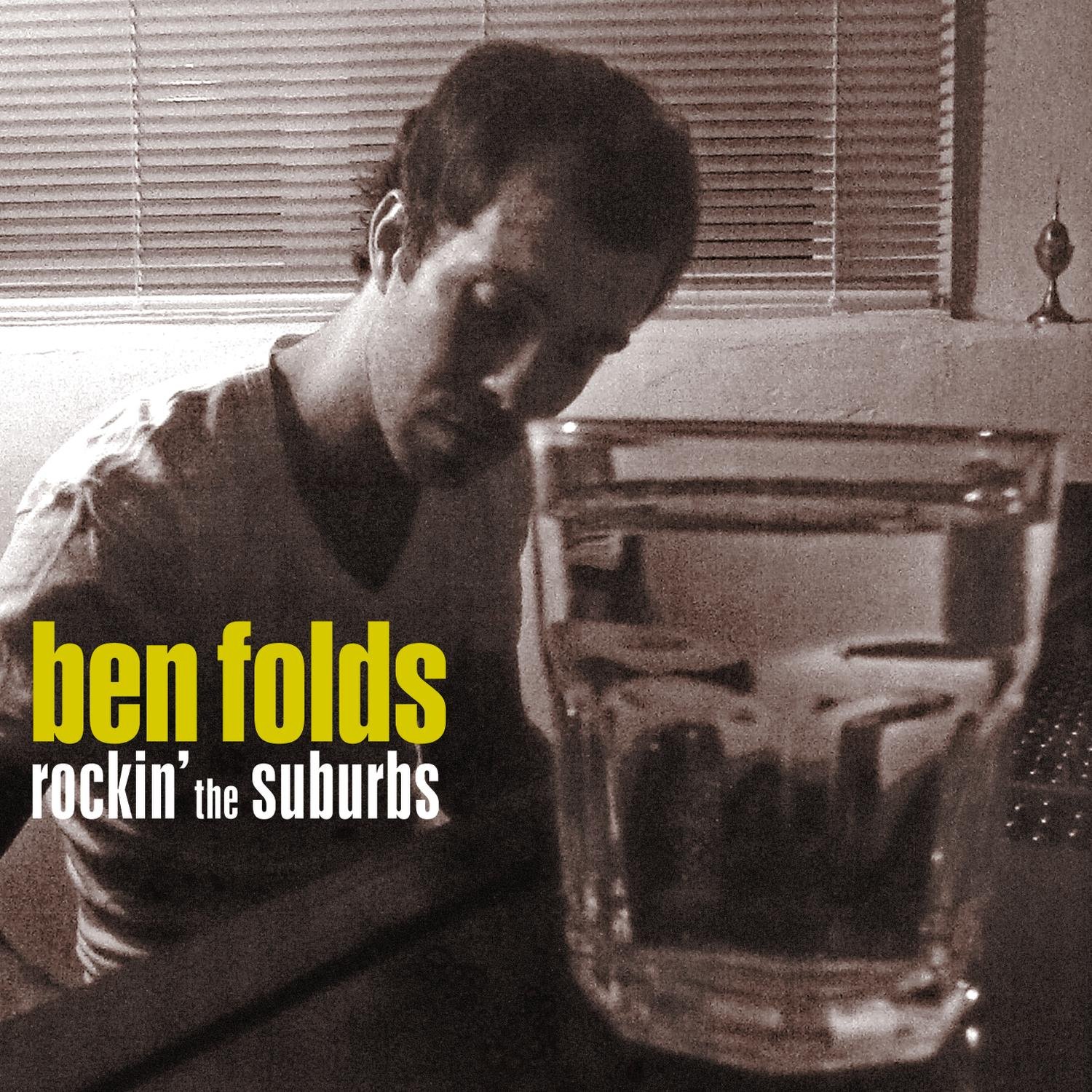- Epic
- 2001
The "Rockin' The Suburbs" video was doing a lot. As the lead single and title track from Ben Folds' debut solo album, the song established new parameters for Folds' music following his three-album run at the head of North Carolina cult favorites Ben Folds Five. That band had been a strictly piano-bass-drums operation -- an oddity within a '90s alternative rock culture defined by guitars, though maybe less odd at a moment when shit like the swing revival was happening concurrently. (For further reference, please see this MTV news post about Ben Folds Five and Squirrel Nut Zippers joining the H.O.R.D.E. Tour lineup.) "Rockin' The Suburbs" boasted a quirky keyboard melody and the kind of blunt-force vocal hooks long associated with Ben Folds Five, but it also began with distorted guitar chords and ended with a funky rock breakdown worthy of the Red Hot Chili Peppers. Directed by "Weird Al" Yankovic, the video featured a band full of Ben Foldses, each one clutching a different instrument, as if to telegraph the absence of former bandmates Darren Jessee and Robert Sledge. Folds was making it clear that he had entered a new era, out on his own.
Simultaneously, he was sending up the nü-metal scene that had been dominating MTV in the years surrounding Y2K. In his lyrics for "Rockin' The Suburbs," Folds scoffed at the idea that life as a white man from a wealthy neighborhood would foment the kind of uncontrolled rage witnessed in songs such as Limp Bizkit's "Break Stuff" and at events like Woodstock '99. "Let me tell y'all what it's like/ Being male, middle-class and white," the song began. "It's a bitch, if you don't believe, listen up to my new CD." By the end, he was sarcastically screaming, "You better look out because I'm gonna say fuck!" As if anyone could miss the joke, in the video he donned Fred Durst's red baseball cap, and the final scene found his all-Folds band rocking in a room full of bullet holes like the one from Korn's "Freak On A Leash" video. Ben Folds had gone solo, and he was here to take the piss out of the Family Values Tour.
Really, though, "Rockin' The Suburbs" the song was a feint. Rockin' The Suburbs the album -- released 20 years ago this week on the godforsaken date of Sept. 11, 2001 along with umpteen other noteworthy albums -- was a lot softer, smoother, and more saccharine than the title track suggested. With Ben Folds Five, Folds had fashioned himself as a smarmy Gen-X update on the piano-man archetype established by the likes of Elton John and Billy Joel. Piano remained his primary instrument here -- pounded-out chords on "Annie Waits," high-speed arpeggios on "Zak And Sara," plucking out plaintive melodies on "Still Fighting It," and on from there. He'd made the single such an outlier, he once explained, because he was angling for a hit by mimicking the dominant sounds of the airwaves: "The only way I can do that without making myself sick is to make fun of what’s on the radio."
As the story goes, Folds wrote "Rockin' The Suburbs" as an act of retaliation after Korn's Jonathan Davis told Spin magazine, "All we want to do is bring heavy back into rock n' roll. Because goddamned Ben Folds Five sucks." Responding to such provocation is fair game, and in the rap-rockers and their fans, Folds found an easy target. But given the vitriolic cries of "Give me my money back, you bitch!" on Ben Folds Five's 1998 single "Song For The Dumped," it's debatable whether Folds really had grounds to satirize this crew's unmerited aggression. Furthermore, grouping Rage Against The Machine in with Bizkit and Korn -- the all-white background throughout much of "Rockin' The Suburbs" recalled RATM's "Guerilla Radio" video -- was a clumsy gesture that underscored the lack of nuance in his parody.
"Rockin' The Suburbs" did have this much in common with the rest of the album: It was obscenely catchy. "I wanted to make a pop album," Folds explained at the time. "I had a lot of songs. I wanted to make them three or four minutes long with great choruses." To Folds, writing tight pop tracks was a lot harder than letting songs wander any which way and calling them experimental. But he was skilled at this craft, and Rockin' The Suburbs achieved his goal. The songs are expertly constructed, pummeling you with hook after hook, both vocal and instrumental. They get in and get out, and they stick with you long after the album has ended. As a melodicist, a pianist, and an arranger, Folds was crackling in this moment.
Folds was still often channeling the maudlin moods and chamber-pop flourishes of Ben Folds Five's 1999 swan song The Unauthorized Biography Of Reinhold Messner, but he was making sure to punch up his songs with some of his biggest, brightest hooks. He and co-producer Ben Grosse recorded the album in a church in Adelaide, where Folds had relocated with his wife. Together, they shaved off most of the cantankerous rough edges from Ben Folds Five. Even the loud, fast ones traded out that old rowdiness for a sparkling professionalism that would serve as the main delineator between solo Folds and his old band. Think of it as a piano-led complement to Weezer's "Green Album," which famously reined-in a self-consciously geeky singer-songwriter's more chaotic instincts in favor of something impeccably streamlined.
There was more variety to Rockin' The Suburbs than that comparison implies, though. And where Rivers Cuomo was writing intentionally vague lyrics, Folds was crafting incredibly specific character sketches. "Zak And Sara" depicts a young woman forced to pretend she's interested in her boyfriend's rudimentary guitar work."Not The Same" relates the true story of a Folds acquaintance who dropped acid at a party, climbed a tree, and came back down a born-again Christian. And in "Fred Jones Pt. 2," a genuinely moving ballad about a newspaperman forced into early retirement, Folds came through with something like his very own "Eleanor Rigby"; each new pass through the refrain "I'm sorry, Mr. Jones, it's time" is more heartbreaking than the last.
Not every attempted tearjerker lands with such impact. There are songs on Rockin' The Suburbs that emphasize how Hallmark-grade schlocky Folds' songwriting can be. Closer "The Luckiest" is a cloying tribute to Folds' wife at the time, his third of five. He wrote "Still Fighting It," a power ballad about how growing up is weird and painful but we adults are still hanging in there, for one of their twin babies. It's one of those songs like Coldplay's "Fix You" that sometimes sweeps me away despite its hokey qualities. Even some of the character sketches fall flat: The rote "The Ascent Of Stan" tracks a former hippie revolutionary gone corporate -- not the most original concept 17 years after Don Henley saw a Deadhead sticker on a Cadillac, and one that's not nearly as fascinating as the dance beat Folds randomly threw beneath neoclassical piano on the chorus.
If Folds can be off-putting in both sincere and sarcastic mode, he was magnetic to a nerdy teenager with a sentimental streak who would one day grow up to watch This Is Us despite my better judgment. Not only did I attend the tour behind Rockin' The Suburbs, two years later I drove out of state to see Folds do a solo piano gig supporting the Ben Folds Live album. At some point in my twenties I decided I was too cool to keep up with his output, but returning to Rockin' The Suburbs now, I'm reminded of why the album so charmed me in the moment. The voices weaving in and out of his arrangements, the way his piano cascaded like a graceful shifting landscape beneath his songs, the ability to spin a handful of details into immersive short stories, transcendent melodies galore: Ben Folds may not have rocked as defined by the king of nü-metal scat, but he definitely didn't suck.






